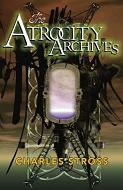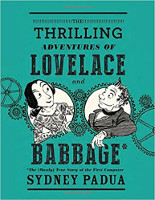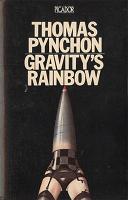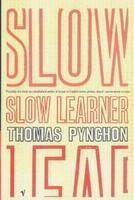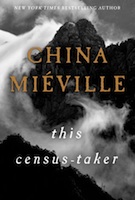 I've recently been paying a lot of attention to world building, and how the authors use their world in their works. This Census Taker by China Miéville is quite an outlier here – whilst you get the feeling that there is an extensive, well worked-out world with loads of history and structure out there you are given nothing of it which is not absolutely necessary for the story at hand, leaving you yearning to learn more.
I've recently been paying a lot of attention to world building, and how the authors use their world in their works. This Census Taker by China Miéville is quite an outlier here – whilst you get the feeling that there is an extensive, well worked-out world with loads of history and structure out there you are given nothing of it which is not absolutely necessary for the story at hand, leaving you yearning to learn more.
Miéville is a London-based writer and academic with 10 or 11 novels (depending on how you count) and a good number of non-fiction publications under his belt. He is the winner of multiple awards, including the BSFA, Clarke, and Hugo, and he has no fewer than 5 books coming into the shops in 2016, this being one of them.
What is This Census Taker about? The story starts with a boy – the protagonist? - recalling how he ran down the hill from his family's dwellings into town, to tell how his mother had killed his father. Or his father his mother, he is/was not entirely clear. He has spent his youth, up to that point, as an Uphiller, as high up the slope as is possible whilst still being part of this town spreading across two sides of a ravine, linked by a bridge.
His father makes keys. Keys which make things happen – are they magic? People come to him with their problems, with their requests, and he makes them a key. No, it is never explained how this works, or what his father's skills are (I'm sure it's in the worldbuilding, but it's a detail not necessary to the story told).
His life seems to be one without possessions; when he was a boy, when he was with the gang of rogue children in the town, and as a Census Taker. And now as a prisoner?
You see, this book is ostensibly written as a memoir, written by the Census Taker of the title. Or, at least most of the book is written by this Census Taker, some parts of his books – a Census Taker writes 3 of them, with different aims and contents – were written by his predecessor(s -?) on the job.
The story is written in the first and third person, frequently mixed, sometimes in the same sentence. But all we are told is told from the perspective of the boy, or rather the reminiscent Census Taker, who is now a 'honoured guest', somewhere, with guards outside his door.
The prose feels dry, sparse, without fripperies or spare words. Clearly this was not written by the young boy - a smart, impressionable, and every so slightly strange/alien boy from a strange family of outsiders in a strange place; but by someone who knows the value of precise, brief information, recorded clearly.
There are lots of tantalising hints in the story – this is a post-high-civilisation world it appears. There was an age of machines and automation, against which there was some kind of historical uprising – somewhere between Luddism and Bildersturm I felt – where all/most of it was smashed to bits, and people went back to the their simpler, harder, self-determined lifes. There are hints of politics, history, and wars, but nothing but the hints which the boy picked up from his environment are reported here – I'm sure Miéville could set a whole series of books in this world, and not run out of structure, of depth to work in – but he's not giving it away, not in this book.
Recommended reading (it's a slim volume), as you might have gathered.
More China Miéville
Title: This Census Taker
Author: China Miéville
Reviewer: Markus
Reviewer URL: http://thierstein.net
Publisher: Picador
Publisher URL: http://www.picador.com
Publication Date: 2016
Review Date: 160326
ISBN: 9781509812141
Pages: 140
Format: HP, small format
Topic: Post-High Civilisation
Topic: Slice of Life



